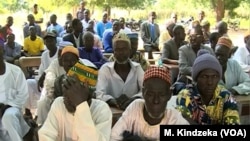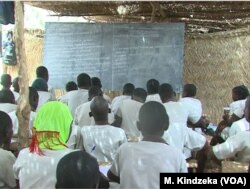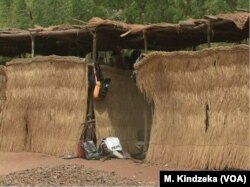This week marks five years since Boko Haram militants kidnapped hundreds of Nigerian schoolgirls from the village of Chibok. The kidnappings spread fear across the border in Cameroon, where hundreds of schools closed. Authorities have since ordered schools to reopen, but many students and teachers refuse to return.
In an effort to convince parents that Boko Haram is almost defeated and the schools are safe, Cameroon's Ministry of Basic Education invited families to a government primary school in Achigachia on Cameroon's northern border with Nigeria.
The ministry's delegation head, Gilbert Wanyou, says security measures have been taken to protect schools.
"You do not get into the school without a thorough search," he said. "We must identify you to know who is in the school. Inside the campus, we do not bring the students together as we used to do in the yesteryears for morning assembly and so on and so forth."
Boko Haram's abduction five years ago of 276 schoolgirls in Nigeria's Chibok, in addition to local attacks and school burnings, caused many parents in Cameroon to pull their children from schools.
The Achigachia school had 3,000 children in 2014, but that number dropped to 400.
Seventeen-year-old Ali Mamouda says he will never return there to study. Boko Haram kidnapped him from school four years ago. He was held captive for two years before Cameroon's military freed him.
Mamouda says he will never go back to the school because he is a living witness of Boko Haram brutality, simply because he defied their demand to stop going to school. He says he is not sure anyone is safe at the border school, and he does not wish his friends to be victims of Boko Haram by attending classes there.
Teacher Etienne Mainimo was transferred to a border school, but says he decided to remain in a safer area after Boko Haram fighters killed his peers.
He laments that kids are being deprived of an education.
"If nothing is done, I want to tell you that the future of the children who are the leaders of tomorrow is in great danger because very few of them [are] going to school," Mainimo said.
The government of Cameroon says it needs to construct at least 7,000 classrooms to replace those torched by Boko Haram.
The governor of Cameroon's Far North Region, Midjiyawa Bakari, says hundreds of teachers and staff refuse to return to work.
Bakari has documented the names of about 1,000 staff who have been absent for two to three years, but are still receiving salaries, he says, adding that he will forward those names to the ministers of public service and finance for sanctions.
Bakari says he is calling on parents to secure their children's future by making sure they go to school. However, parents fear Boko Haram supporters are still operating in the area.
Boko Haram extended its attacks from Nigeria to Cameroon in 2013, after Cameroonian troops began assisting the Nigerian military in fighting the extremists.
Cameroon estimates more than 1,500 of its citizens have been killed in the fight against Boko Haram, and more than 45,000 students displaced in northern areas.






